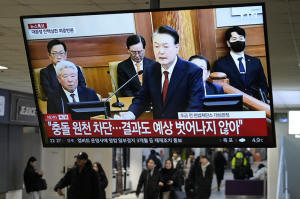Court orders South Korean President Yoon released from jail for his
criminal trial over martial law
[March 07, 2025]
By HYUNG-JIN KIM
SEOUL, South Korea (AP) — A South Korean court on Friday ordered
impeached President Yoon Suk Yeol to be released from jail, a move that
would allow Yoon to stand trial for his rebellion charge.
Yoon was arrested and indicted in January over his short-lived
imposition of martial law late last year.
The hearings in his separate impeachment trial at the Constitutional
Court concluded in late February, and that court is expected to rule
soon on whether to formally remove him from office or reinstate him.
The Seoul Central District Court said it accepted Yoon’s request to be
released from jail because the legal period of his formal arrest expired
before he was indicted for alleged rebellion in connection with the
martial law decree in late January.
The court also cited the need to resolve questions over the legality of
the investigations on Yoon. Yoon’s lawyers have accused the
investigative agency that detained him before his formal arrest of
lacking legal authority to probe rebellion charges.
Investigators have alleged that the martial-law decree amounted to
rebellion. If he’s convicted of that offense, he would face the death
penalty or life imprisonment.

Yoon's defense team welcomed the court's decision and urged prosecutors
to release him immediately. The presidential office also welcomed the
court’s decision, saying it hopes Yoon will swiftly return to work.
However, South Korea law allows prosecutors to hold a suspect
temporarily while they pursue an appeal.
The main liberal opposition Democratic Party, which led Yoon’s Dec. 14
impeachment, called on prosecutors to immediately appeal the court’s
ruling.
Yoon’s martial law decree, which involved the dispatch of troops and
police forces to the National Assembly, evoked traumatic memories of
past military rules among many South Koreans. The decree lasted only
six hours, after enough lawmakers managed to get into an assembly
hall and voted to overturn it unanimously.
[to top of second column]
|

A TV screen shows footage of impeached South Korean President Yoon
Suk Yeol's address at the final hearing of his trial during a news
program at a bus terminal in Seoul, South Korea, Tuesday, Feb. 25,
2025. (AP Photo/Ahn Young-joo)

Yoon later argued his decree was only meant to inform the people of
the danger of the main liberal opposition Democratic Party, which
undermined his agenda and impeached top officials, and said he
dispatched troops to the assembly only in order to maintain order.
But some top military and police officers sent to the assembly have
told Constitutional Court hearings or investigators that Yoon
ordered them to drag out lawmakers to obstruct a vote on his decree
or detain politicians.
If the Constitutional Court upholds Yoon’s impeachment, he will be
officially thrown out of office and a national election will be held
to choose his successor within two months.
Massive rallies by opponents and supporters of Yoon have filled the
streets of Seoul and other major South Korean cities. Whatever the
Constitutional Court decides, experts say it will likely further
polarize the country and intensify its conservative-liberal divide.
Yoon is the first South Korean president to be arrested while in
office. South Korean law gives a president immunity from most
criminal prosecution, but not for grave charges like rebellion or
treason.
By law, a president in South Korea has the power to put the country
under martial law in wartime and similar emergency situations, but
many experts say South Korea wasn’t in such a state when Yoon
declared martial law.
All contents © copyright 2025 Associated Press. All rights reserved
 |